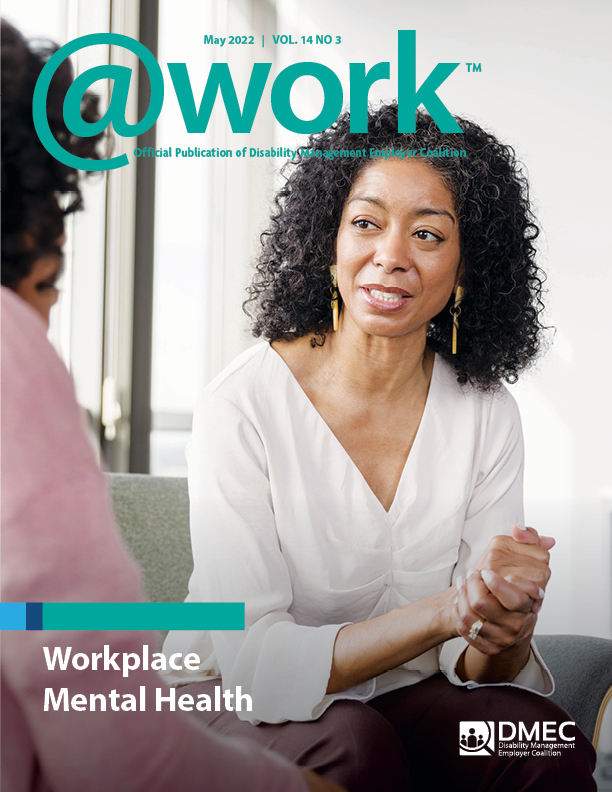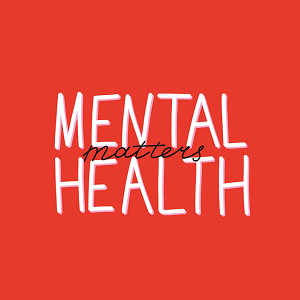
Workplace Mental Health
May/June 2022
More employers recognize the role they can play in employee mental health and well-being and are investing more time and energy in encouraging overall better health. This issue of @Work magazine highlights actionable ways employers can ensure parity with benefits, provide inclusive and psychologically safe environments, and design return-to-work processes that support employee mental health.
The CEO’s Desk
More Employers Embrace Their Role in Influencing Employee Mental Health
There is a lot to unpack when it comes to workplace mental health, and while it’s rewarding to see improvements, we have a long way to go. Employers are in powerful positions to influence the mental health and well-being of employees. Read more.

Features
Future-Proof Your Workforce: Behavioral Health Insights to Help Retain Employees
The pandemic has challenged individual and organizational resilience, and it is reshaping the economy. By acknowledging this reality and focusing on employee well-being, employers can retain employees, recruit additional workers, and future-proof their operations. Read more.

Breaking Down Barriers to Mental Health Parity in Disability Plans
The timeline of mental health parity legislation shows that progress has been made, but it has been slow and only focused on parity between mental health compared with medical and surgical benefits. This leaves a big gap in other areas of insurance, which maintains the stigma related to mental illness and substance use disorders and results in embedded discriminatory practices and bias. Read more.

Spotlight Articles
Program Showcase
Supporting Worker Mental Health: An Essential Retention Strategy During COVID-19 and Beyond
Although employers recognized the importance of employee mental health, mental wellness, work-life balance, and overall workforce morale before the pandemic, these considerations have become even more central during the last two years as employers responded to changes made to how, where, and when employees do their work. Read more.

Employer Perspective
Communicating With Challenging Employees
Assisting employees who are going through difficult times is the nature of integrated absence and disability management work. How this interaction begins can set the stage for future communications. After an initial contact, some employees may require additional assistance, and many will be challenging to work with during the process. Read more.

Program Showcase
How Employers Can Support Employee Mental Health
Life has changed significantly during the last two years. Many have lost or changed jobs, and we have all experienced lockdown, social distancing, and masking. As employees are returning to the workplace, attending in-person conferences, traveling, and hosting face-to-face meetings, employers must consider an aspect of this transition that can’t be seen: employees’ mental health. Read more.

Program Showcase
Is All Well in the “State of Work”?
In many ways, COVID-19 was the hammer that shattered the illusion that all was well in the state of work. During the last two years, many employees (particularly women) have experienced different ways of working that, for some, worked better. And they’d like to keep it that way. On the other hand, the intense intermingling of women’s personal and professional lives — and the challenges associated with it — became more obvious to working women, their families, and their employers. Read more.

Expanded Perspectives:
@Work to Share
DMEC provides the following @Work magazine articles and podcast episodes to offer additional perspectives on and increase awareness of integrated absence management trends and challenges. The resources — available to members and nonmembers — can be shared with your colleagues and through social media channels.
2022 Trends
Adding “Paid” to the Statutory Family Leave Equation at Breakneck Speed
In addition to monitoring and communicating statutory PFL and PFML leaves (as well as differences between programs for employers that operate in multiple states), absence professionals must also consider equity and fairness (perceived and real) across employee populations. The relatively new patchwork of laws creates unintentional disparities in the amount of pay, eligibility, definition of family members, and length of leave. Taking a holistic view is important. Read more.

DMEC Podcast
Employers See Opportunities Amid Waves of PFL and PFML Laws
While challenging to implement, paid family leave (PFL) and paid family and medical leave (PFML) laws provide employers with an opportunity to revise benefits and policies to ensure equity and fairness, and to attract and retain talent. Listen in to this issue as Terri L. Rhodes talks with Jessica Bolar, product manager for The Standard; and Regina Stringer, director of integrated absence management for Walmart about tracking and implementing these laws. Listen.
DMEC Podcast
Intersectionality: A Valuable Tool to Normalize Disability in the Workplace
In this episode you’ll get insights about intersectionality, a valuable tool that helps absence management professionals guide employees with disabilities through the return-to-work process. Pilar Vélez, a DMEC member and ADA Program Manager and Global Benefits Program Manager with Intel Corporation, provides a uniquely valuable perspective that is both moving and inspirational. Listen.
DMEC Podcast
Ways Employers Can Support and Encourage Employee Mental Health and Well-Being
Supporting mental health and wellness is a priority for employers that are seeing an increase in people dying from “diseases of despair.” Dr. Dan Jolivet, a psychologist and workplace possibilities practice consultant for The Standard, offers practical tips and guidance for employers that want to invest in the mental health and wellness of their employees, and how they can measure success. Listen.
Columns
Absence Matters
Helping Employees Find a Work-Life Balance
One of the best ways to keep employees engaged and successful at work is to encourage them to enjoy their lives outside of work. A work-life balance is the special ingredient that helps employees be at their best while at work. And for employers, managing employee well-being is crucial to retaining talent and promoting healthy, sustainable lifestyles. Read more.

Integrated Absence Management
Crossing the Threshold: Successful Reentry to the Office Environment
More employees are returning to the office and to regular activities, including business travel, that were suspended during the height of the pandemic. Workplace norms, however, have been challenged. To ensure that employees’ transition back to the office is successful, employers must address employee needs and concerns. Read more.

Engaging Today’s Workforce
How Disability Insurance Can Help Address Today’s Mental Health Crisis in The Workplace
Economic stability is one of five social determinants of health, which influence well-being, quality of life, and health. Organizations have identified the link between financial insecurity and mental health issues, which can stem from the social stigma of experiencing financial hardship. Disability insurance and other paid leave options can be a lifeline for employees struggling with financial and mental health. Read more.

Employer Solutions
A Disability Inclusion: Strategies for a Productive, Engaged Workforce
To be inclusive of what isn’t readily seen, such as mental health conditions, requires a companywide commitment to education and empathy to remove stigma as a barrier to employees asking for help. People can be treated and accommodated successfully for many mental health conditions while productively employed. Read more.

Common Sense Compliance
How Do You Manage Mental Health Conversations to Ensure Compliance?
It can be challenging to manage conversations with employees about mental health medical conditions in a compliant way given the varied legal requirements. But if employers promote mental wellness benefits and foster a supportive workplace environment, they can help employees in need and maintain compliance with legal requirements. Read more.

Featured Case
What Happens When Employees Fail to Provide Timely FMLA Certifications
What if an FMLA certification is not returned on time or at all? This feature case illustrates that employers must explain and follow through on the consequences for not returning FMLA certifications, which may include denial or delay of FMLA-covered leave. Read more.

The Disabled Workforce
Supporting the Mental Health of Your Workforce
Employers across the country are experiencing increased accommodation requests along with performance and attendance issues related to stress and mental health. What can absence management professionals do? Start by understanding the basics of mental illness, mental health-related interactive processes, and reasonable accommodations. Read more.

DMEC RESOURCES
DMEC News
This edition of DMEC news features updates on our inaugural Absence Plan Design and Practices Benchmarking Survey, DMEC’s new Absence Management Perspectives podcast, the latest microcredential course focused on California leave laws, DMEC’s 30th anniversary, mental health resources available to support your organization, and the call for presentations for the 2023 DMEC Compliance Conference. Read more.

Legislative Updates
Check out the latest federal, state, and local compliance updates on DMEC Legislative Updates. Recent posts cover updates to Washington’s paid Family and Medical Leave Act; new leave laws in Delaware, Maryland, Virginia, and the District of Columbia; and more. Read more.
Be sure to follow DMEC on Twitter, Facebook, and LinkedIn for additional insight & up-to-date news.

Continue the Conversation
Share insights and ideas about the Workplace Mental Health issue with other DMEC members in the DMECommunities Mental Health Group and check out author Dan Jolivet’s tips for future-proofing your workforce from the live Q&A hosted on May 11.
DMEC’s online networking groups give you the opportunity to connect with industry peers, ask/answer questions, share resources, and seek feedback. Get started.


@Work™ magazine is the official publication of the Disability Management Employer Coalition. Copyright© 2022, Disability Management Employer Coalition (DMEC). All rights reserved.
Editorial Policy
The goal of @Work is to present industry and Association news, highlight member achievements, and promote the exchange of specialized professional information. The statements and opinions expressed herein are those of the individual authors and do not necessarily represent the views of the Association, its staff, board of directors, or its editors. Likewise, the appearance of advertisers does not constitute an endorsement of products or services featured in this, past, or subsequent issues of this publication. DMEC makes no representations, warranties, or assurances as to accuracy of the information contained in the articles, and no content herein is legal or tax advice. Consult appropriate professionals for legal or tax advice.
Editorial Staff
Editor: Heather Grimshaw
Editorial Advisory Group: Linda Croushore, Rebecca Fisco, Steven Genduso, Jenny Haykin, Terri Morris, Fred Schott, Jessica Thornton, Lori Vickory






